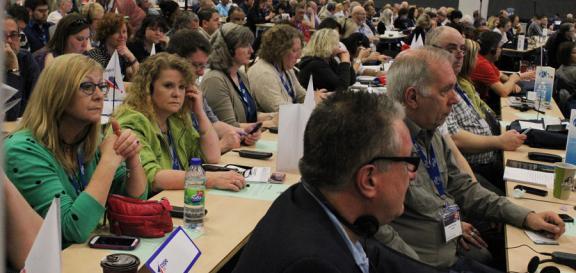Thirteen MoveUP delegates joined union activists from across Canada in Montreal for the first day of the Canadian Labour Congress’ 27th Constitutional Convention today.
The day kicked off with greetings from Chief Billy Two-Rivers, Quebec Federation of Labour President Daniel Boyer, Montreal Labour Council President Danielle Casara, and Montreal Mayor Denis Coderre.
Coderre spoke strongly about the importance of the labour movement and our campaign for fairness.
“’together FAIRNESS WORKS’ clearly sums up the challenges of our modern world,” Coderre stated, noting particularly the importance of expanding pension plans and defend Canada Post.
Wearing a ballcap that proclaimed support for postal workers, Coderre said, “I find it totally unacceptable to see the way that Canada Post is behaving, not just towards its workers but to all citizens.”
After introductory greetings, CLC President Ken Georgetti opened the convention with his comments on the state of the labour movement in Canada.
“Our members know that together, fairness works. Workers in every occupation join our movement because they understand together fairness works,” Georgetti said.
Georgetti criticized the Harper government for their attacks on independent scientists and First Nations, as well as unions. He added, “The Conservatives are trying to subvert our democracy for their own political self-interests with their Elections Act changes.”
But he noted that Canadian union members have already shown the Harper Conservatives they cannot trample over labour rights.
“They thought we would blow over when faced with a wave of legislative assaults. But they were wrong,” Georgetti noted, citing the CLC’s successes holding off the anti-union bill C-377.
“We don’t intend to thank them; we intend to defeat them next year at the polls.”
Georgetti vowed that the Canadian labour movement would fight tooth and nail against any kind of legislation that would impose so-called “right to work” laws, which would allow employees to refuse to pay union dues while still receiving union benefits, forcing their coworkers to pay more.
“There’s going to be no Michigans in Canada – not now, not ever,” Georgetti vowed.
Georgetti said the CLC and unions across Canada are working to make sure members can take pride in their union. He cited the “union advantage”: union members in Canada earn nearly $5 more per hour than non-union workers, and provide $785.8 million into the Canadian economy each week.
“That’s the message Canadians should hear about unions,” Georgetti stated.
Another priority Georgetti mentioned for the labour movement is the Temporary Foreign Worker Program: “Sisters and brothers, we stand up for all workers and we demand that young and low-wage workers come first, we demand migrant workers be treated fairly, and we demand immigration reforms that give migrant workers a real pathway to citizenship.”
After lunch, delegates returned to hear from Sharan Burrow, first female president of the International Trade Union Confederation (pictured right), and EKOS Research President Frank Graves.
Burrow congratulated Canadian labour activists, saying: “Your commitment to collective action…is legendary around the world.”
She and Graves focused their speeches around the last decade or so of economic changes, which are increasing the income gap and look to be setting future generations further behind.
Graves first noticed the issue when the statistics started to show that Canadians no longer felt they were moving ahead of their parents’ generation.
“The public believe, and I think they’re right, that the economy is changing profoundly… The current generation sees themselves uncertain as to whether they’re going backward or forward,” he observed.
“With the exception of a very few nations in the world, we can’t find optimism anywhere, yet the governments still lack the political will to take action in the interests of their own people,” said Burrow, who referenced a survey showing 51 per cent of Canadians saying their income has fallen behind cost of living, with 34 per cent saying they’re struggling to make ends meet.
“This belief that progress is no longer available and that it may already be unravelling, particularly for younger generations, is something that requires our urgent attention,” Graves echoed.
Graves noted that inequality does not help the economy: “The places which have the highest levels of inequality are the places that have the lowest levels of intergenerational mobility.” He argued we have both a moral argument and a clear economic argument for fairness.
“Just continuing the way we are isn’t going to solve the problem,” he stated. On a positive note, he reviewed polling results that showed strong public support in Canada for fairer taxation and measures to link CEO salaries to those of their lowest-paid employees.
Burrow had words of encouragement for unions: “Your capacity to engage your members and your communities is your strength.”
To close the main day, convention debated and passed resolutions on the economy, starting with a review of the CLC’s policy paper: An Economy for a Fairer Tomorrow.
The paper outlines how we see the economy in Canada and how the labour movement can move forward for a “stronger economy and fairer society.” Convention endorsed the paper’s recommendations, reaffirming shared priorities such as: investing in infrastructure and fair transition to greener jobs; support for training for unemployed and under-represented groups of workers; increasing economic security for all workers by improving Employment Insurance and the Canada Pension Plan; and investing in skills development and workplace training for all Canadians.
The last resolution of the day was passed in support of greater investment in public post-secondary education and skills training.



